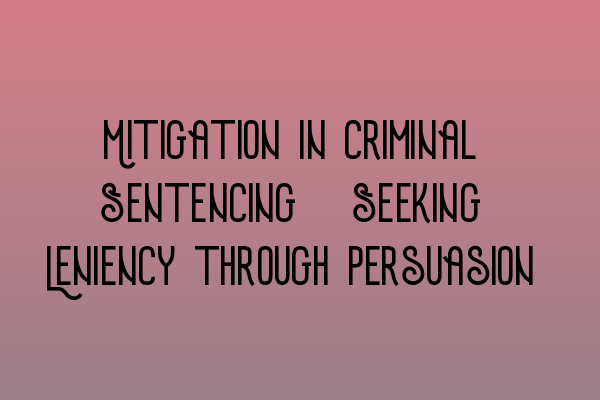Mitigation in Criminal Sentencing: Seeking Leniency through Persuasion
When facing criminal charges, one of the most critical stages of the legal process is the sentencing hearing. This is where the court determines the appropriate punishment for a convicted individual. However, it is important to understand that there are opportunities for mitigation, which can help in seeking leniency and reducing the severity of the sentence imposed.
What is Mitigation?
Mitigation refers to the process of presenting evidence and arguments to the court that aim to lessen the seriousness of the offense committed and convince the judge to impose a more lenient sentence. A well-prepared and persuasive mitigation strategy can make a significant difference in the outcome of a sentencing hearing.
The Role of a Solicitor in Mitigation
As a solicitor, your role in the mitigation process is crucial. It is your responsibility to gather relevant evidence, interview witnesses, and build a strong case for your client. Effective communication and presentation skills are essential in convincing the court to consider mitigating factors.
Key Factors in Mitigation
There are various factors that can be considered during mitigation, including:
- The defendant’s previous good character
- Remorse and willingness to make amends
- Personal circumstances, such as age, health, and family responsibilities
- Cooperation with law enforcement or any assistance provided in resolving the case
- Any relevant mental health issues or addiction problems
- Contributions to the community or positive impact on others
Constructing a Persuasive Mitigation Argument
To construct a persuasive mitigation argument, it is important to:
- Thoroughly analyze the case and identify any potential mitigating factors
- Gather supporting evidence, such as character references, testimonials, or expert opinions
- Organize and present the evidence in a clear and compelling manner
- Articulate a strong narrative that highlights the defendant’s unique circumstances and emphasizes their potential for rehabilitation
- Address any aggravating factors raised by the prosecution in a respectful and persuasive way
- Craft a plea for leniency that is tailored to the specific circumstances of the case
Understanding the Sentencing Guidelines
In order to effectively advocate for leniency, it is essential to have a thorough understanding of the relevant sentencing guidelines and case law. Familiarize yourself with the precedents and principles that relate to your client’s situation, and use them to support your arguments. Additionally, staying updated with any changes in the law is crucial to providing the most current and accurate advice to your clients.
Conclusion
Mitigation in criminal sentencing is a complex and delicate process that requires careful preparation and persuasive advocacy. As a solicitor, it is your responsibility to ensure that your client’s voice is heard and that all relevant mitigating factors are considered by the court. By employing effective communication, thorough research, and strong presentation skills, you can significantly increase the chances of securing a more favorable outcome for your clients.
For more information on SQE 1 and SQE 2 preparation, visit our related articles:
